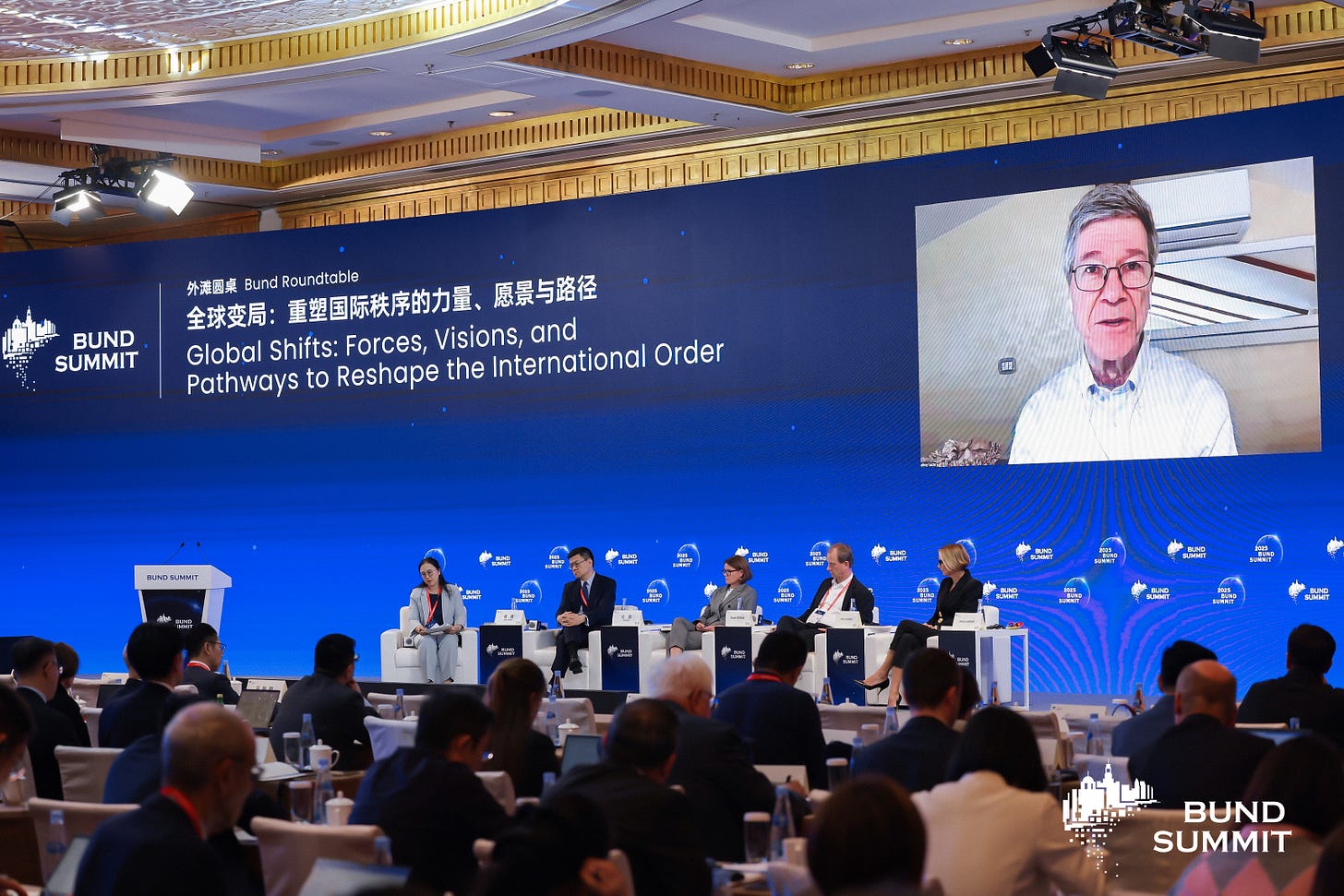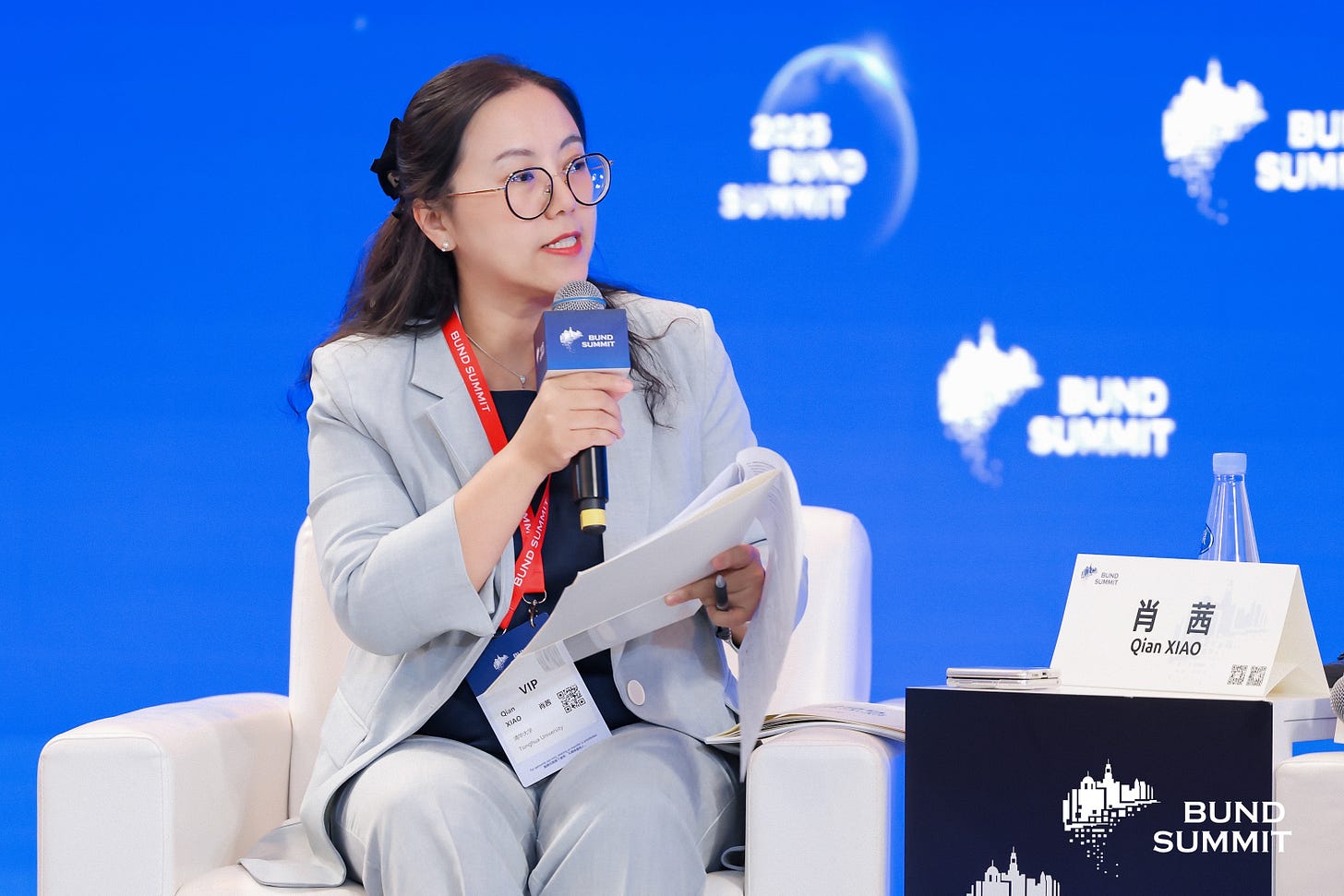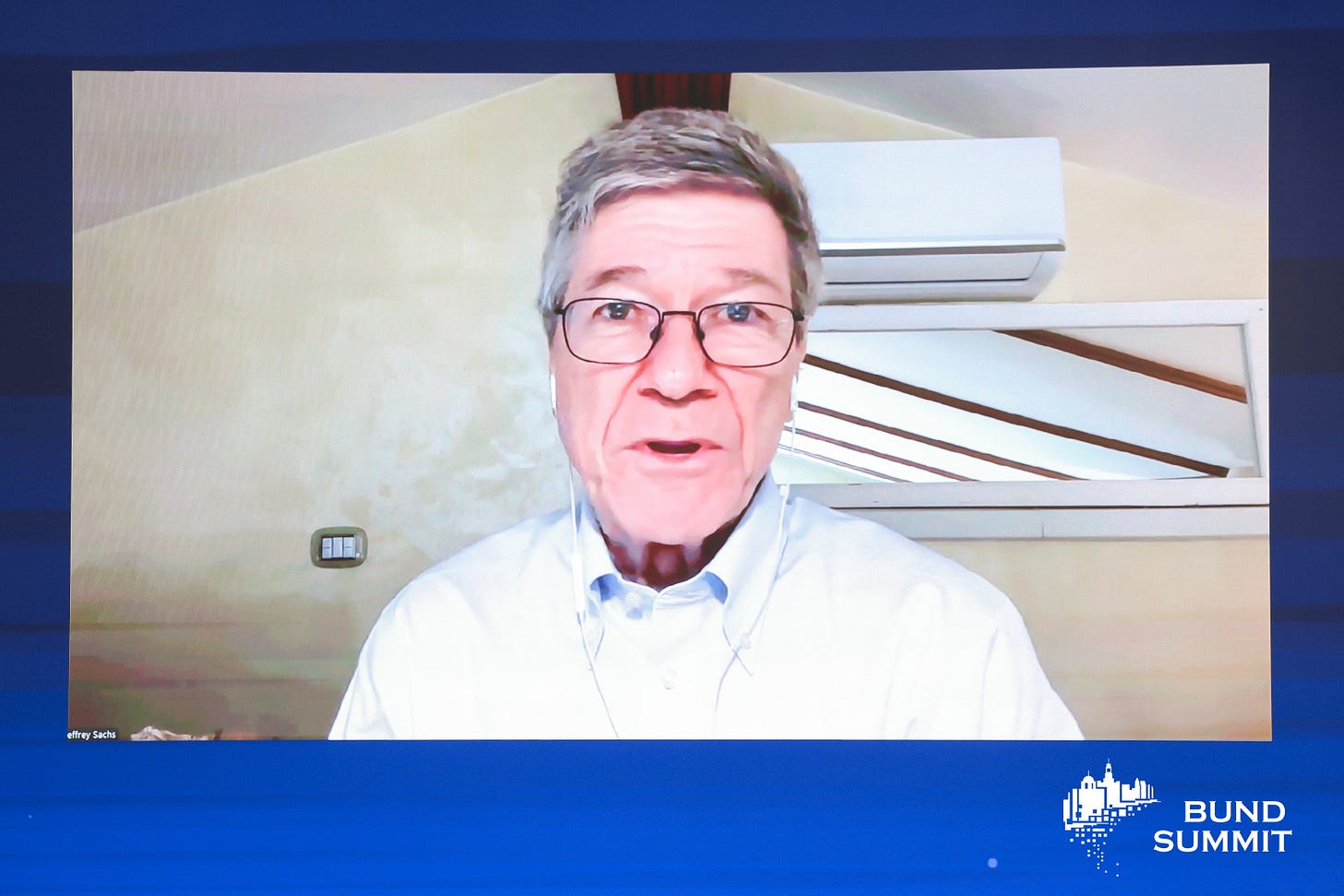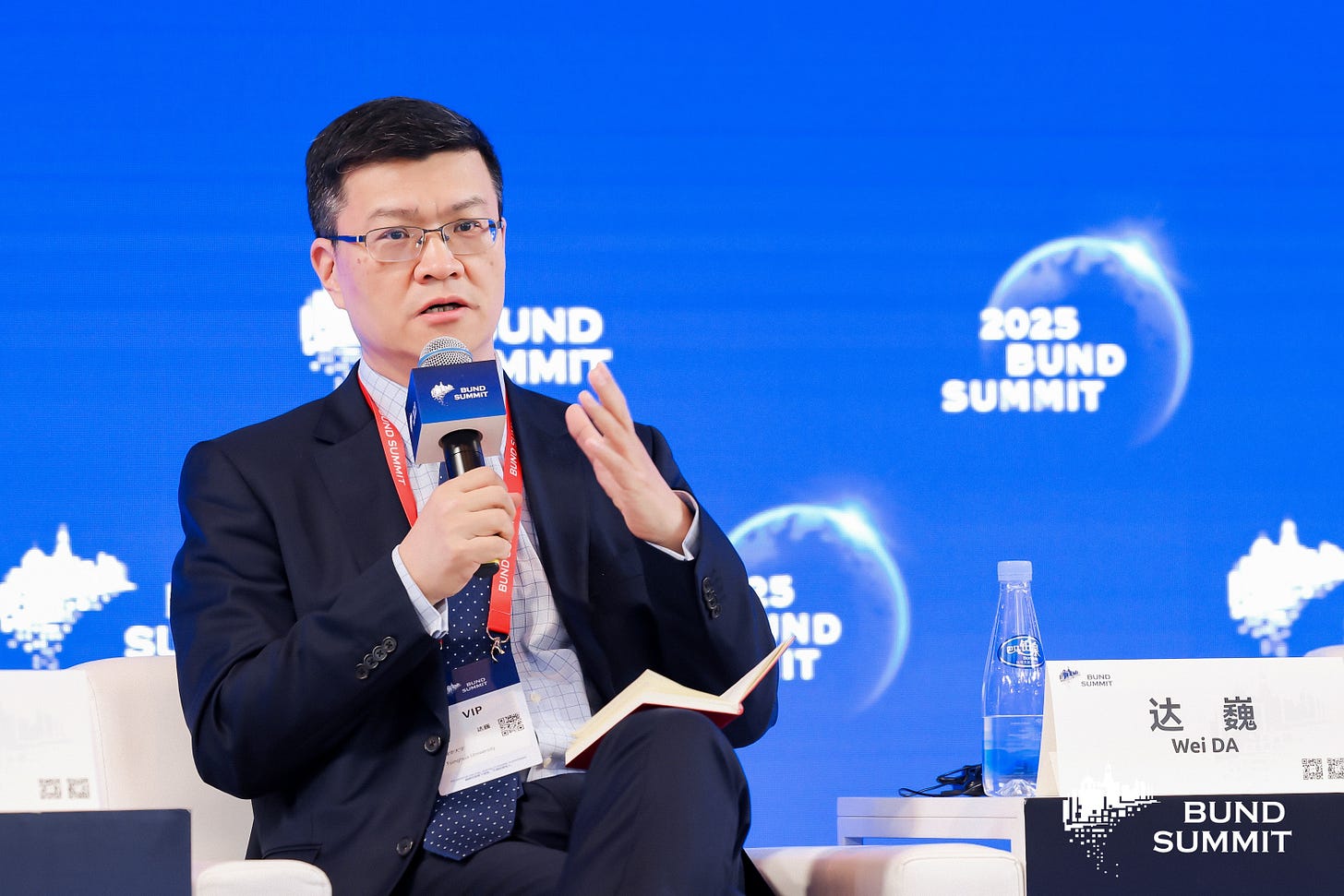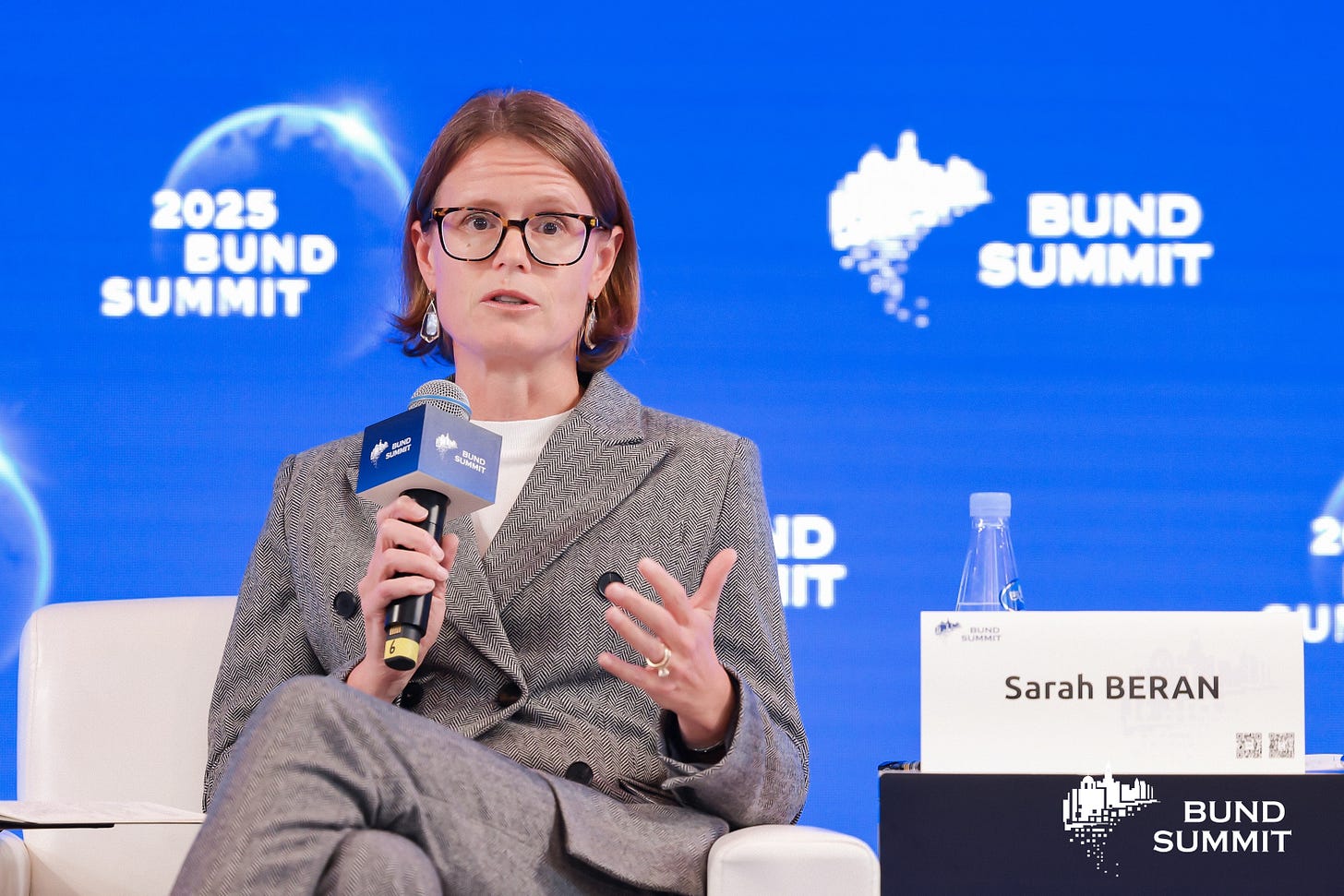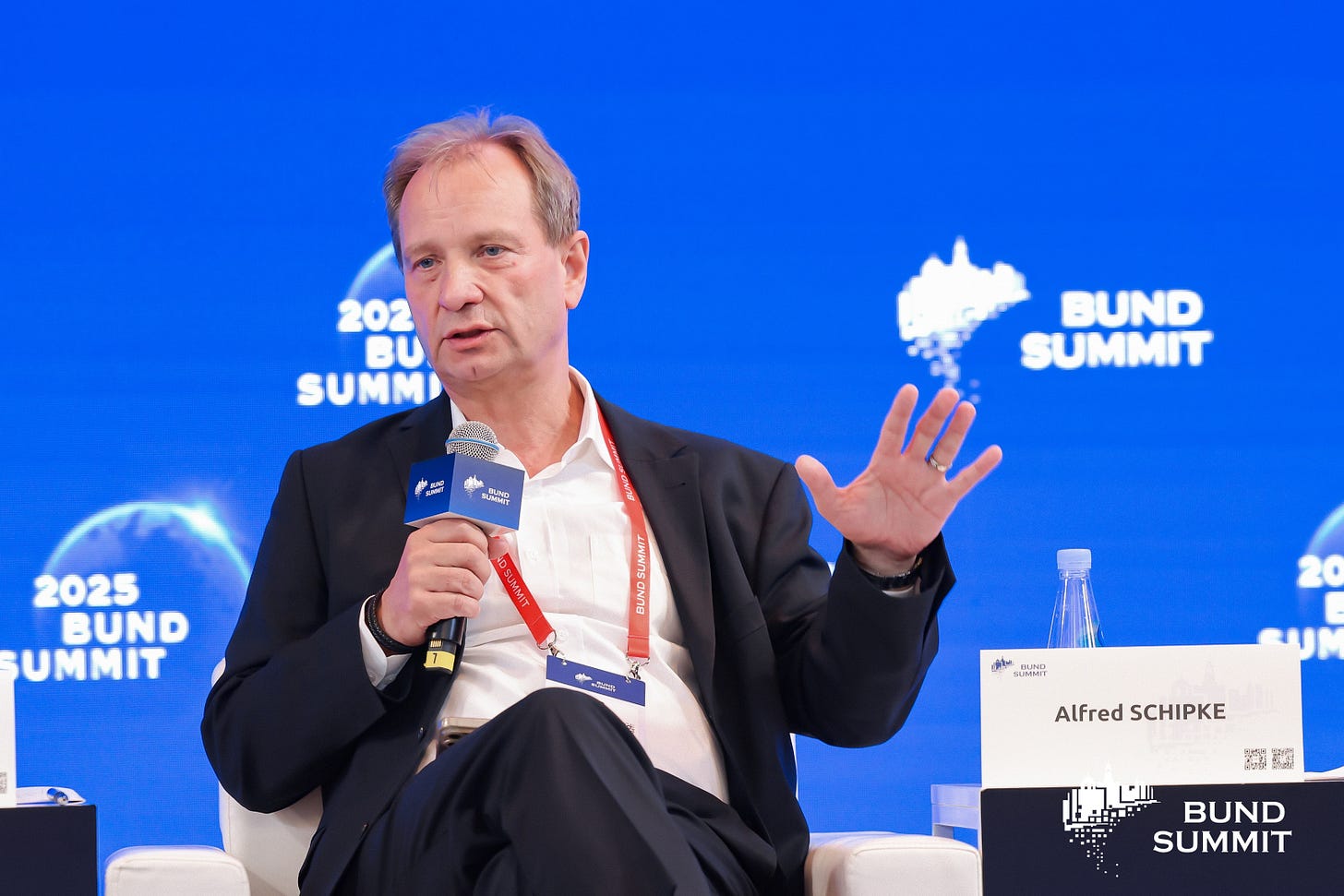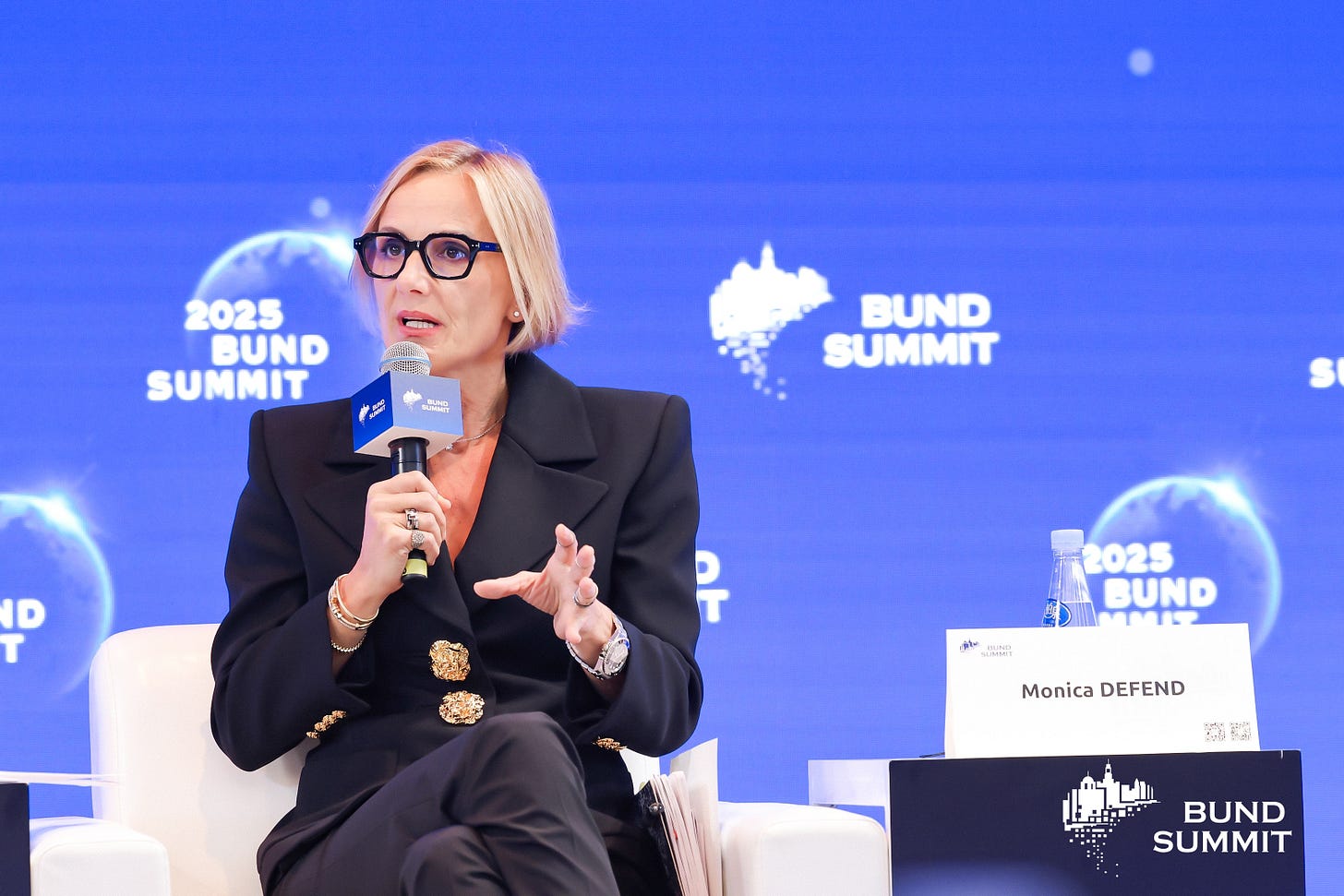Transcript: Geopolitics, Tech, and Finance in Transition at Shanghai's Bund Summit
A roundtable with Qian XIAO, Wei Da, Sarah Beran, Alfred Schipke, Monica Defend, and Jeffrey Sachs organized by China Finance 40 Forum (CF40) and Tsinghua University
The 2025 Bund Summit took place in Shanghai from October 23 to 25 under the theme “Navigating Global Transformation: New Order, New Tech”.
Hosted by the China Finance 40 Forum (CF40), a leading non-governmental thinktank in finance and economics, and Tsinghua University, Bund Summit brought together over 700 leaders from the financial sector, government, and academia across 21 countries and regions to explore economic, financial, and governance challenges amid the twin transformations of global order reconstruction and technological revolution.
On October 23, at the 2025 Bund Summit,
Jeffrey SACHS, University Professor and Director, Center for Sustainable Development, Columbia University;
Wei DA, Director, Center for International Security and Strategy, Tsinghua University;
Sarah BERAN, Partner, Macro Advisory Partners;
Alfred SCHIPKE, Professor of the Practice, Lee Kuan Yew School of Public Policy and Director, East Asian Institute, National University of Singapore;
Monica DEFEND, Head of Amundi Investment Institute & Chief Strategist and Member of Executive Committee of Amundi,
joined the Bund Roundtable discussion themed“Global Shifts: Forces, Visions, and Pathways to Reshape the International Order”.
The discussion was moderated by Qian XIAO, Deputy Director, Institute for International Strategic and Security Studies, Tsinghua University.
The following is an excerpt from the transcript of the roundtable discussion, produced and provided by CF40, one of the two organizers.
Qian XIAO
Good afternoon. Distinguished guests, welcome to our session “Global Shifts: Forces, Visions and Pathways to Reshape the International Order”. As we heard from the previous speakers and the panelists that the world today stands at a pivotal juncture, we are witnessing a profound transformation of power, ideas and institutions, driven by the accelerating trend toward multi polarity, the technological revolution and the deepening political rivalries.
Among these disruptions, lie new opportunities to redefine fairness, inclusiveness and sustainability in how nations cooperate. So our panel today aims to explore what forces are driving these transformations and how we envision the emerging international order, and what practical pathways can lead us toward a more just and resilient world.
I would like to begin by unpacking the forces that are driving today’s transformation. So my first question will go to Professor Jeffrey Sachs. You have long emphasized the moral and the structure foundations of global cooperation. From your perspective, what are the most transformative forces, economic, technological, or ecological or political reshaping the international order today? Please. Thank you.
Jeffrey SACHS
Thank you very much. What a great pleasure it is to be with this wonderful panel and at the Bund Summit. There are five major forces reshaping the world scene that I’d like to emphasize.
The first, of course, is geopolitical.The return of China to the center stage of world economy, finance, technology and politics is fundamental. We are at the end of a several hundred year domination of the world by the Western powers. We all sense that. But this is a very stressed period.
The United States’ power is real. It continues. It is definitely not a unipolar world, but the US Military Industrial Complex fights for its continued dominance, and sometimes that spills over into hot wars, as in Ukraine, but it spills over into pervasive tensions all over the world.
The US maintains a sanctions regime against dozens of countries. It tries to use the financing power of the dollar as an instrument of continued US hegemony and so on. This is our geopolitical reality, a multipolar world in which the dominant power fights for continued primacy, which it no longer has, but which makes the world extremely dangerous in that continued fight.
The second major forcing is ecological, the environmental crisis is real, deep, accelerating, pervasive. It involves, of course, three major interrelated crises, human induced climate change, the destruction of ecosystems and ecosystem services, meaning the loss of biodiversity and the dysfunctionality of river sheds, of fresh water supplies, of wetlands, of rain forests, of alpine regions and so on. And the third of those ecological crises is the massive pollution, the toxic chemicals and plastics that pervade the environment.
The third major driver of technological international upheaval, of course, is the interrelated technological revolutions. All in some sense, driven by the digital computational era. But we have revolutions, of course, in artificial intelligence, in connectivity, in computation, in biology and biotechnology, in material science and so forth. These technologies are all dual use. They can be militarized or used for civilian purposes. They are both solutions to world problems as well as creators of new crises. And I could elaborate, but I think we all know that in the nuclear age, the biotechnology age, the AI and digital age, we have some extraordinarily serious, ungoverned risks.
The fourth point that I would make is that the concentration of power is unprecedented because of the interplay of geopolitics and technology. The digital world is inherently a world of concentrated power. A few platforms know every keystroke that people are making, surveillance, monitoring, targeting, media manipulation in the West, ownership of the media in a very few hands, the concentration of wealth, where 10 Americans, all in the tech sector, have $2.3 trillion of personal wealth.
The corruption of the political system by this concentration of wealth, because it’s fair to say Silicon Valley owns the White House rather than the other way around, and that Silicon Valley has the upper hand vis a vis the Pentagon rather than the other way around, is something new. American democracy hardly functions anymore, and this concentration of power is an extraordinary feature.
The final point that I would make as a forcing is demographic change. We are at the end of the long cycle of rapid global population growth. In fact, the population has peaked or soon will peak in almost all of the world except for Africa. But, but in Africa, the population will continue to expand by another 2 billion people or so.
By later in this century we’ll have around nine to nine and a half billion people. Africa will constitute perhaps 25% or even 30% of the world population. China’s population is likely to decline significantly. So we will have major demographic shifts, of course, a completely urban global society, a much larger population in Africa, an aging population in China and indeed in most of the world.
And these demographic shifts also will make a very large difference. One economically is that Africa will play a much larger role in global affairs, economic, political, cultural, than in probably ever before in modern history of the last hundreds of years.
These five fundamental factors, geopolitical crisis, ecological crisis, dramatic technological change, the concentration of power driven by the digital technologies, especially in, I would say, the United States, where the tech sector dominates our politics and society, and the demographic changes are all simultaneously driving global change, making the world unstable, at risk of the serious tipping points, at risk of even escalating war, major, further environmental crises, and profound difficulty of achieving a shared sense of how to manage global affairs right now. So that’s a very quick summary, and I turn it back to you.
Qian XIAO
Thank you, professor SACHS, for your comprehensive description of these five forces that are transforming our world. And I’m particularly interested in the fourth one. The concentration of power, which has been mentioned a few times this morning during the panel discussion on AI and financial sector, so we hope we can have more discussion on that later.
So my second question is to professor Wei DA. Professor Da, you have long been one of the most perceptive analysts of the involving international order and China-US relations. So given that the trajectory of this bilateral relationship has profoundly influenced the structure of global governance and into national order, how would you characterize the current dynamics between China and the United States? And in what ways are these dynamics reshaping the international order?
Wei DA
Thank you very much. First of all, I want to say I’m very happy to join Bund Summit, and also the CISS, the organization that both Xiao Qian and I worked in. We are very happy to be a co-organizer of this Bund Summit.
I also want to say I was trained as a political scientist, so I rarely attend any summit about the economy and finance. But now I’m here so that shows we are not in a good time right? When political scientists join economic summit or financial summit, that means we are suffering. So I’m very sorry for that.
With your question, I want to characterize the differences between past ten months and past ten years or eight years. What are the differences we have experienced? So three point I want to make.
The first is in the past ten months we have witnessed the change of American foreign policy, which is of course, have a coherent logic with the first term of Trump administration and Biden administration, but some new characters. I think the biggest change for me is we are witnessing the Trump administration seriously adjusting, changing its relations or US relations with the rest of the world. So in the first term, from China’s perspective, the policy looks more like US versus China. So for Biden administration again, from our perspective, Sarah can correct me from our perspective, it’s some kind of West versus China. So now the trend is the US versus the rest of the world.
By saying that I’m not saying, you know, criticizing Trump administration, and I think the Trump administration is doing something seriously rooted in the reality, in the United States and in the world, that the old pattern of economic and social growth during the globalization time has ended. So the Trump administration is trying to change the old security and economic pattern with the rest of the world, which was formed during the era of globalization and tried to shape something based on nationalism.
So I think this is of course the Trump administration’s policy. But I also think this is a change shared probably by two parties in the United States. And no matter other countries, like it or not, no matter China, like it or not, I think it will continue. So this is the first character.
The second is, I call the strategic decoupling between China and the United States. So I’m not a believer of decoupling. I don’t think China and the US will decouple completely. But for the past four decades, I will say China always think that the long-term prosperity of this country really depends on a good external environment in which China-US relations is a key. So you can say China linked our long-term development with a good, a strong China-US relations.
And I think during the same period, the US also believe Asia Pacific is the, you know, future of the world economy. And China is a gravity of this region. So the US also linked its long-term prosperity with this region, particularly with China.
But now I think the two countries, both countries, change that strategy. So both countries turn around, look inside and try to build a strategy which is based on our domestic development or inner circulation. So the scope of the change of Trump administration’s policy, foreign policy, and also the second runs of tariff war between China US this year, I think confirmed this belief in China, at least this in China, that we will not go back to the old days. I think I’d rather attribute the you know all those deteriorations in the bilateral relations to the end of globalization.
The third change I’ve seen is China has become more confident in past one year. China’s economy shows its resilience. And China’s technology has made some major breakthrough. China shows its military strength through the military parade. So no matter you like it or not, you know, this is the situation we are in.
So under all those three characteristics, I think if we are fortunate, we may build a new pattern between the two countries. The two countries will be more independent from each other rather than dependent to each other. Our relations will be cool and sometimes adversarial, but at the same time we will maintain some cooperation or maybe contacts, and then the relationship could be stable.
I think that’s a relatively normal relation. I think this is the better scenario. Of course That could be worse, you know, bad scenario. I think I run out of my time. So maybe I can, if I have opportunity later I can elaborate a little bit more. Thank you.
Qian XIAO
Okay. Thank you, professor Da. Thank you for sharing with us your observations of both US foreign policy and China’s development and also the new pattern of this bilateral relationship.
Now, Sarah, your turn. We know that diplomacy itself is being reshaped by the same forces transforming the international order. And you have extensive experience navigating the dynamics among major powers. Particularly, you serve as a senior diplomat engaging with China. How do you see diplomacy and confidence building mechanisms, adapting to sustained dialogue and mutual trust in this new environment?
Sarah BERAN
Thanks so much for the question, and it’s great to be here today. Certainly, in my 20 plus years as a diplomat, we tried to knit together the fissures emerging in the multilateral system through diplomacy. And I think where we are today, the fragmentation, the focus on sovereign solutions, indicates this was not entirely an endeavor that succeeded. But there are some lessons I think all of us in the room can draw from the experience of the last decade.
First, as government communications start to decrease, we need to look to other opportunities for dialogue, track two nongovernmental methods to try to at least share the understanding of what is happening, clear up misperceptions, and maintain some level of communication. Events like Bund Summit play an important role in that, through the private sector as well as think tanks.
Second, as multilateral and international organizations start to erode and decrease in importance, we need to look to flexible groupings of states where there are overlapping interests, whereas flexible solutions can be developed for transnational challenges. I expect that we’ll start to see some of this activity around rare earth, as a large number of countries start to seek additional opportunities for diversification, for example.
Fragmentation also means a greater likelihood of conflict, and so the development of crisis management channels is absolutely critical, not just military to military, but government to government and regional as well. And it is only through the development of those kind of crisis management channels that we can hope to avoid conflict. Not just the US and China rub up against each other, but other countries as well.
All that said, we have to deal with the world as it is and not as we want it to be. And the reality is that fragmentation is here to stay for the durate, or at least the midterm. And that means that we need to adapt both companies and countries to trade patterns that are shifting, diversification away from reliance on one trading partner, solutions that can help us sovereign defense solutions.
You see Europe starting to develop its own platforms as its reliance on the United States decreases. Sovereign AI regulation and tech solutions, as each country wants to have its own sovereign solution for this challenge, all this diversification is going to create opportunities both for countries but also for companies, many of whom are in the room today. Trade flows, as they shift, will create additional opportunities for companies to follow those trade flows.
So again, I think the question that we all are faced with, if fragmentation is here to stay for at least the midterm, how do we adapt to that and make sure that the solutions we are presenting, both as countries and as companies, are ones that can actually tackle the problems.
Qian XIAO
Thank you. Sarah. You mentioned that the fragmentation will be here to stay for a long time, and also it provide opportunities for also countries and the companies as well, if we can handle the situation well. Thank you very much for your points.
Now next, I would like to ask Dr. Alfred SCHIPKE. The global financial system remain a key pillar of international stability. As regional financial ecosystems diversify, how can global institutions adapt to maintain stability and inclusiveness across an increasingly complex landscape?
Alfred SCHIPKE
Thank you very much. A pleasure to be here. And listening to my colleagues and economists, I think we have to start thinking more about national security rather than the economic side.
If we look at the latest developments and the discussions that we’ve seen so far as it relates to the global governance structure, it has focused for the most part on trade diversification of trade flows. We have seen the same thing on investment, change in investment flows and of course, the relocation of supply chains. That has been kind of the focus of the discussion.
I think the biggest big concern is that we’re going to see the fragmentation of what I could call the financial plumbing, and I think here we have two forces coming together.
One is geopolitics, where countries are trying to have more strategic independence, euphemism from the US dollar. And there is, of course, the risk that the tensions that we see on the trade side and investment and screening could spill over into the financial system, which is called the weaponization of the financial system. And that creates a humongous incentive for large countries and jurisdictions to increase the degrees of freedom, and move away, as much as possible, from relying solely on the US Dollar.
And that is combined now with the advances in the fintech space. You know, crypto stable coin, for example, I think the genius in the United States has really threatened a lot in the rest of the world, because now there is the risk for further dollarization and the reliance on the US data. And we see already in the data some signs of that. And what it does is it kind of incentivizes countries to be even more active in looking for alternatives.
On the one hand, we hear more about the internationalization of currencies in the region, the RMB. But you go to India and people are talking about the internationalization of the rupee. And of course, Europe wants to maintain its role in terms of the global architecture.
There is another part that one can be concerned about, and that has to do with cross border plumbing or payment systems. It’s a very boring subject, but what we’re seeing is the risk of severe fragmentation that can ultimately then spill back to both trade and investment. To give you a few examples. There are a few initiatives. One of them is called Agora. It has the US, the New York Fed. It has South Korea. It has Japan. It has Mexico and France. Sounds like a very western focused discussion. There’s a particular technology that is being used to connect banks and facilitate transactions. But you can already see from the governance structure that certain countries are not part of this.
Then in this part of the world, there is another project called mBridge, which has this country’s, China with PBoC, Hong Kong monetary authority, Saudi Arabia, UAE, Thailand that’s another governance structure, and it uses a very different technology, very different from the other one.
And if you’re in this part of the world, you have India’s domestic payment system, called UBI, that increasingly is used for cross border transaction, becomes a different standard. And then, of course, Europe is actively trying to accelerate maybe the Euro. So, what it all means is that we don’t know which way things are going. These are to some degree pilots that have not fully been implemented.
But incentives are very large to have governance structure that moves away from what we call a multilateral system to one where you have like-minded joining and then using different technologies. And the system will not be inter-operable anymore.
And that can lead, again, as I appointed, to humongous implications, and coming now from the economic side, to humongous costs for businesses. Because even in the future, you either have to duplicate systems. Probably some large companies can afford to do that, but if you a smaller company, you have to make a decision, which means you’re ending up becoming even more part of a block. And the cost that are associated with this might be large, and it reinforces the segmentation and the fragmentation of the system.
Qian XIAO
Thank you, Doctor SCHIPKE. And you described about how financial markets reacted to this geopolitical tension, and also shared with those your concerns in fragmentation of trade and investment systems, which resulted in really tremendous costs and also huge risks for companies.
Last, but not the least, to Ms. Monica DEFEND. We know that markets often respond faster than policymakers. And you are Head of the Research at the Europe’s largest asset management firm. So I want to ask you, how do you see global capital and investment flows adjusting to this geopolitical and technological shifts? Please.
Monica DEFEND
Yeah, thank you. And thank you for inviting me and bringing the investor angle to is a distinguished panel. You said that markets act faster. This is true, because our job is the one of anticipating what policy makers will be doing. And the usual question we get was the market pricing. So this is the questions, the question. I’ve been grown up as a market strategist.
Then amid this new global disorder, because this is how I would call it, I see the market role changing. In particular, there is a two-way communication we are now establishing how with policymakers.
Think about at the US Treasury, and its interaction to any of the policy actions and US administration is pushing on. The bond market today is kind of giving the guardrails to the policymakers. 4% on the ten years, it’s fine; 4.5, 4.75, they are becoming nervous. 5, it’s a snap. So in the past, it was the equity market. Today it is the bond market, at least in the United States.
Let’s turn to the question you address me. I really think there is an axis between geopolitics and technology. Geopolitics is entrenched today at the point that we talk about geoeconomics as one of the pillars we have to consider when we address asset location choices, and for hedges in the portfolio, which, if we look at artificial intelligence, which is an infrastructure of powers, Quantum computers semi-conductors. They are not only commodity. There are strategic, classic classes that you have to consider at the point that, if we consider how much it has been spent on semiconductors, we are talking about above them, 400 billion US dollars, led by Asia and the United States.
And again, if I look at productivity, national security, and valuation, the three are very much linked. And more than 60% of the traffic data today flows from Asia to Middle East, is not crossing the Atlantic. So this is another change that we are seeing in flows.
FDI again here, and here in September, I think we have a plus 12 percent. And this is led by India and Asian country. So all these fragmentations, I would say, the tech tectonic change we are experiencing is really shifting powers. It is really pouring new agents into the landscape, and the investment landscaping in particular.
Qian XIAO
Very good point. Thank you for all the panelists sharing your insight and reflections on the driving forces behind this international transformation. Now, let us move from diagnosis to more like a direction from understanding the forces that it may play to imagining the visions one might get the next development.
So my first question will go to Professor SACHS. You’ve often spoken about the moral imperatives of global corporation, especially around sustainable development, climate action and digital equity. If you were to envision a renewed multilateral order for the 21st century, what guiding principles or institutional reforms would you prioritize to ensure that science, technology and sustainability become common goods, rather than the sources of division? Please, Professor SACHS.
Jeffrey SACHS
Thank you very much. All of the panels talked about fragmentation, but the cost of this is very high. Not only do we break the efficiencies of the world economy, but we raise the likelihood of outright conflict. So the main moral issue is that we should not go in that direction.
The main driver of this fragmentation is the United States of America. It’s not China. It’s not inevitable. It’s not underlying forces. It is a very misguided attempt of a country that has been dominant for a decade to maintain its dominance, despite the diffusion and rise of technological capabilities and economic productivity.
So my view is that the most important thing that could happen would be a change of the US mindset. It’s not going to happen in the Trump period. There is very little mind there. There’s a lot reactivity, but no real strategy. And what the United States is doing is extraordinarily self-defeating. It is breaking things, but it is not fixing anything.
And when Alfred SCHIPKE talked about the fragmentation of the payment system, it is precisely because the US weaponized the dollar. It confiscated the reserves of many countries, of course, most famously Venezuela and Russia, but many others as well. And it used the payment system as an enforcement mechanism for sanctions – sanctions applying to dozens of countries. This is what has fragmented a global payment system more than anything else. So the most important positive development would be a change of the US mindset, which could come because what the US is doing is utterly self-destructive as well as globally dangerous.
But beyond that, let me say that I believe that what China has been doing, in building the bricks, in building the Shanghai Cooperation Organization, in its relations with Africa and the 55 countries of the African Union, means that an alternative of possibility is that the United States absence itself from the world, from the climate crisis, from development processes and so forth.
It becomes protectionist, but most of the rest of the world stays together, because that is the efficient, correct, peaceful direction. This is also not an impossible view that the U.S. commits major self-harm, but the multilateral system actually strengthens because the vast majority of the world wants peace, trade, investment, and solutions to ecological crises. I believe that we should be reinforcing the United Nations in this regard. I have argued that China should open a major UN campus in Beijing.
China is the world leader of decarbonization because China is absolutely the world leader in solar power, wind power, in electric vehicles, in digitalization of smart energy systems, in the hydrogen economy, and I would like to see a major UN campus in China that is devoted to the worldwide ecological transformation. That would solidify the global multilateralism in the right direction. It would make the UN more broadly owned looking forward. And I think that it would strengthen the likelihood that the United States will wake up to reality, stop being so belligerent and unilateral.
We must escape this dichotomy that it’s nationalism or global institutions. It’s got to be both. Right now, the nationalism is being driven by the America First Agenda of a country desperately trying to maintain its primacy and unable to do so. Let’s get our minds around the right approach that will be peaceful, productive, and solution-oriented.
Qian XIAO
Thank you, Professor Sachs. Thank you for raising the United Nations here. China is actively supporting the roles played by the United Nations, and I know that UNU is going to have a hub here in Shanghai, as you mentioned, so it’s a positive direction here. Talking about the U.S., you mentioned that the U.S. must change its mindset.
So, based on your research of U.S.-China relations, Professor Da, do you think that is going to happen?
And also, what practical pathways do you see for major and emerging powers to coexist without falling into rivalry traps?
Wei DA
Yes, of course, I want the U.S. to change the mindset, of course, but probably it won’t. I think the world is, we mentioned the fragmentation, I think fragmentation is actually, you know, when the world evolves from a globalized one into a nationalistic one, of course, it’s fragmented. So, I think for us, the most important thing is, first is to change the narrative, change the narrative. We need to manage the bilateral relations. we do need to work on crisis prevention and crisis management.
Qian XIAO
Thank you, Professor Da. Sarah, also the question to you. Speaking of this fragmentation, from your diplomatic perspective, what kind of innovations do you think could help countries to navigate through this fragmentation and also build trust and then make global governance more representative?
And also another question is that we know that U.S. has initiated a lot of a mini-lateralism or this kind of institutions, regional partnerships, so do you think this will complement or fragment the global system, please?
Sarah BERAN
Thanks for the question. Moving from a unipolar system to a multipolar one involves fragmentation. That is part of the definition. And so, the question is less how do we prevent it, which I think we all agree in this room is probably not possible, and more how do we adapt to it and prevent the downside risks that both Da Wei and Alfred were talking about.
And you know, I think we’ve got lessons on what not to do. And so, how do we ensure that the institutions we’re building now, or the flexible groupings, are more adaptive to the needs of the day? There are, you know, there are a multitude of transnational challenges that we should all be in favor of tackling, right? AI safety and risk, pandemics, terrorism to some extent as well.
There are, I think, already some of these groupings that exist, BRICS and SCO are both sub-regional groupings that have, I think, developed out of a need to find alternatives to the UN and to the WTO. The United States, in turn, I think, has looked at the G7 as a flexible grouping to tackle challenges over the course of several administrations.
We have sub-regional or regional trade groupings as well. But it’s important to note, I think, that the rise of Donald Trump is not the reason for fragmentation. It is a symptom of it, right? He may be an accelerant of this fragmentation in many ways with the actions, but when he exits stage left, this issue is still going to be in front of us, and the groupings that we develop now are going to be critical to solving some of the challenges.
Qian XIAO
Thank you, Sarah. Well, you are right, indeed, that all these mini-lateral organizations and the groupings are in some way efficiently solving some of the problems, as long as they are not targeted at particular countries or regions when dealing with international issues.
Next, back to finance. Dr. Schipke, how can the international financial architecture, because you have worked experience from the IMF, so from the IMF and the World Bank to regional development banks and digital currency initiatives involved to better serve this multi-polar world, please?
Alfred SCHIPKE
I think the challenge for international organization, Jeffrey Sachs already talked about the United Nations, to continue to be relevant is more important than ever, but at the same time, they are under attack. So, I think the most important thing is that they will remain relevant, that the membership remains the same, and that there are no major countries potentially threatening to leave.
What they can provide is, at a minimum, a forum for multilateral dialogue to emphasize what the cost of fragmentation is. I think that’s what they have been doing quite effectively. Now, that doesn’t always then lead to a consensus in how to overcome it, but potentially finding the largest number of countries that are willing to adapt common standards for example, and the international financial institutions can be critical for that. If that’s not possible, then at least to think about how to ensure interoperability of different systems if they were to develop.
The second one is, I think we should not be naive that the world is changing, and that means we will have alternative institutions. We already have, of course, the New Development Bank. We have the AIIB. If you think about the broader BRICS structure, these are early stages, but it’s clear that the path will continue. They will be larger, more relevant, and ultimately try to facilitate the internationalization of other currencies.
But maybe to highlight one issue, when you look at this part of the world, Asia, there’s another part of the world that equally has been benefiting from the global governance and the trade system that we know, and that’s Europe. We have had a lot of discussions already today, but it’s usually China, the U.S., and then it’s basically the end of the story. One would think that the incentives are very high for those two to have a stronger dialogue on how to maintain and, in certain areas, develop common standards, because if you have these two major blocks, as heterogeneous as they might be within, find some common ground, that could be a third anchor that I think is so much needed in a world that is currently discussing mostly China and the United States.
Qian XIAO
Thank you. Ms. Defend, very quick question because of the time limit. What does a financially sustainable global order look like to you? I mean, it’s very difficult, but I hope you can answer it in a few sentences. Thank you.
Monica DEFEND
Well, I think really that the link between capital and climate is undergoing one of these structural regime changes we are trying to identify as market investors, and I’m not talking about the ESG criteria that now we use when selecting where to invest, but it is clear that with this super capital expenditure cycle, there has been a push, a boost towards the need of energy security and decarbonization. So, it is not by chance that this year, in 2025, we’ve seen the expenditure to global clean energy averaging something like 18 trillion US dollar, that for the first time is higher than the expenditure in fossil fuel.
At the same time, we are seeing fiscal policies and industrial production seeking strategic allocation, strategic autonomy. One case is for Europe, but strategic autonomy is our final goal, and we have been identifying the SIU, the Saving and Investment Union, as one of the means to create the architecture to mobilize private and public capital to help the transition.
No way that the public sector cannot do it alone. If we look at the public sector, then, on average, on the advanced economies, we have a 5% deficit. One third is allocated to finance the climate transition, and we are seeing another change in the emerging markets, where we see turning climate finance from dependency to a source, really, of influence out of the emerging markets.
So, I would really aim at going into a kind of climate cooperation 2.0, maybe setting a floor to carbon prices divided by advanced economies, emerging markets, and low income, really to force the cut of the emissions by 2030.
Qian XIAO
Okay, thank you. Well, as we have less than four minutes left, so as we approach our closing reflections, I’d like to invite each of you to share in one or two sentences what actionable steps, whether diplomatic, financial, technological, or societal, can move us closer to a more sustainable and equitable global system. Let’s start from Monica, and then we go back. So, hopefully, we can have Professor Sachs to make the concluding remarks. Please.
Monica DEFEND
Well, for sure, I would set some financial guardrails in order, really, to give protocols for sanctions, for example, stating trusted tech corridors, given the revolution we are going on to find a mutual recognition of the risks that are coming out of artificial intelligence.
And last, but not least, because this is really important, establish digital public infrastructure, as for example, it has been done in India with the UPI.
Alfred SCHIPKE
For me, maybe just two points. I think we need to focus more on the risk of the fragmentation that comes from the financial sector. The discussion has so far been mostly on trade and to some degree investment, but the risks are humongous and the cost for businesses as well.
And the second one, as I pointed out, I think there is a true opportunity for increased coordination and communication between this part of the world and Europe, and one should take the opportunity as new standards are being developed, rather than each part moving into their own direction, therefore contributing to the fragmentation.
Sarah BERAN
I’ll keep it short. I would just say, whether you’re an international institution, a company, or a country, you must adapt to this fragmentation or risk irrelevance. And for companies, at least, that means planning against multiple scenarios. And so planning against those multiple scenarios and stress testing your business plans are absolutely critical.
Jeffrey SACHS
Don’t give in to fragmentation. There are very powerful reasons for cooperation. First, to avoid blowing the world up. Second, there are huge gains from cooperation. The idea of climate cooperation is vital, and it also underpins what Alfred Schipke was emphasizing, China-European cooperation. Both are in the direction of climate safety and energy transformation. So, the grounds for cooperation are very strong.
Don’t let the U.S. mindset destabilize the whole world, and the U.S. will come back to cooperation at some point. The rest of the world should move ahead in a cooperative fashion at a minimum, and I think we heard a lot of good suggestions about how that could be done.
And yes, meet and talk with each other, exactly as Professor Da Wei just emphasized. Dialogue and negotiation are absolutely essential. Don’t believe you know what the adversary is thinking or going to do, and don’t believe that they’re necessarily an adversary. Through diplomacy, we can overcome what is this rather mindless and dangerous and reactive and emotion-laden fragmentation, which should be avoided and averted.
Qian XIAO
Thank you very much. And with that perfect ending, let’s conclude this panel. Huge thanks to our fabulous panelists for contributing to this dialogue at the Bund Summit. Thank you.


